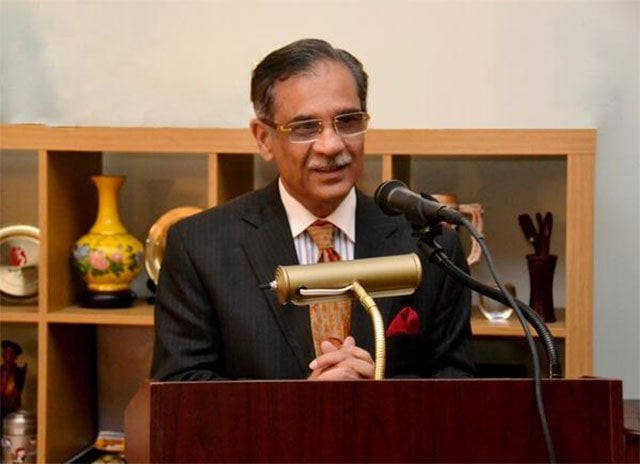New CJP: Re-inventing judiciary’s image main challenge
The process of appointing judges was criticised by lawyers and parliamentarians

Chief Justice of Pakistan Saqib Nisar. PHOTO: TWITTER
Justics Nisar’s tenure will be the longest after the term of former chief justice Iftikhar Muhammad Chaudhry, who served as the chief justice for more than six years.
Although the superior judiciary emerged as one of the most powerful institutions of the country during Chaudhry Iftikhar’s tenure, doubts were cast on its conduct.
During Iftikhar Chaudhry’s tenure, it was alleged that the superior judiciary overstepped its jurisdiction and the nation was still facing consequences of those actions.
His successors tried to roll back Iftikhar’s policy of judicial activism by adopting a policy of judicial restraint but were unable to win back people’s hearts. Main reason for this are: Other civilian institutions are not functioning in a proper manner and people mistrust their impartiality and they view the Supreme Court as their last hope.
Adjudication of political matters also damaged the superior judiciary’s image because all political parties want rulings in their favor. If the court ruled adversely, supporters of political parties started maligning the judiciary.
Recently, a smear campaign was launched against the superior judiciary on social media after the case on Panama Papers was adjourned.
Although lawyers condemned the social media campaign against judges, they also urged the new chief justice to improve the judiciary’s image.
Next elections
Legal experts say that upcoming general elections of 2018 will also be a challenge for the new chief justice.
Currently, the judiciary is not interested in allowing judicial officers to perform election duties. However, the judiciary’s role cannot be ruled out in conducting fair elections.
Self-Accountability
The superior judiciary has been lacking in accountability since independence. Even CJP Saqib, in his 127-page note in case on the 18th and 21st amendments questioned the lack of self-accountability within the judiciary.
Although the previous chief justice, as the chairman of the Supreme Judicial Council, shortlisted a few cases of misconduct against judges and issued show-cause notices, no trial could be started.
Senior lawyers are expecting that the new chief justice will activate the council to expedite all pending references.
It has been reported that as many as 250 complaints were registered against judges of superior courts since 2005.
Pending caseload
Although a special bench, led by Justice Asif Saeed Khosa, is successfully disposing of pending criminal appeals, only 900 criminal appeals pending in the apex court are likely to be decided by May this year.
However, the backlog of civil cases surged. At least 30,000 cases are pending in the apex court. The disposal of these cases is also a challenge for the new chief justice.
Appointment of judges
The process of appointing judges was criticised by lawyers and parliamentarians. Although a few seats of judges are vacant in high courts, lawyers expect the new chief justice to appoint judges on merit.
Published in The Express Tribune, January 2nd, 2017.



















COMMENTS
Comments are moderated and generally will be posted if they are on-topic and not abusive.
For more information, please see our Comments FAQ